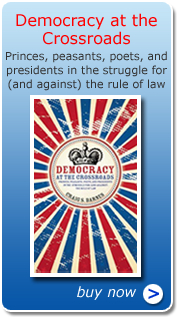When General Sir William Howe attacked George Washington’s continental army during the American revolutionary war, Howe had superior numbers and the support of the world’s most powerful navy. His men were trained, disciplined and courageous, his commanders skilled and experienced. Washington’s army was smaller, less experienced, less well trained. But Washington had surprise, superior intelligence, greater speed, and the corresponding ability to hit hard against a single weak outpost and then run. On Christmas day in 1776, Washington pulled off a surprise attack at Trenton and a week later another at Princeton, New Jersey. These successes caught the eyes of the world. Public opinion began to turn toward support of the rebels. When, in addition, the Hessians who fought with Howe then conducted a policy of "shrecklichkeiten," or "atrocities," to be intentionally committed against American prisoners, a revolution occurred in the minds of the colonials and independence was only a matter of time.
Similar factors are at play in the current war in Iraq. Today, however, the shoe is on the other foot and Americans are in the awkward position of the English in 1776.
Militarily speaking, the locals in Iraq have the advantage of surprise. They, more than we, are able to move their attackers quickly and silently in the night. They, more than we, are able to approach an American post or an Iraqi police station without being seen. They more than we can attack a convoy and melt into the country side.
They also have the advantage of intelligence. They, more than we, know what their enemy is doing. They have sources in and about the American and Iraqi armies. Their sources can tell them where our troops are, when we are in garrison, when we are on the move. Our army is stronger but it is not quieter or more invisible. Iraqi insurgents know who we are; where we are; how many we are. We know none of these things about them.
They also have the advantage of speed. They can move a few attackers, a dozen or half a dozen, far quicker than we can move a platoon, or a company of armored infantry. The larger our unit, the longer it takes to get on the road and so the US military is forever slower than the locals. The rebels can also mass significant power against some weak link in the American front, like a car bomb at a police station. Today, neither Americans nor Iraqis have enough troops to adequately protect all these outposts of authority and one car bomb can blow a government stronghold to smithereens.
Surprise, intelligence, speed of movement, the ability to mass overwhelming power at one small location and then to evaporate were all features of George Washington’s generalship in 1776. Still today they are features of combat that every commander studies at war college. It is no wonder therefore that when, in May, 2002, George W. Bush first proposed to his commanders that they invade Iraq the Joint Chiefs resisted his request. They knew then what the American public is coming to know now; superior force by itself is not enough to quell a local, publicly-supported rebellion.
The president might have foreseen the quagmire had he paid more attention to our own history. He might also have looked to 1588, when the Spanish Armada was defeated by a smaller British fleet acting with speed and surprise and superior intelligence. He might have looked to Napoleon’s experience when he marched 600,000 men into Russia and left 500,000 behind, in the ground. Not even Napoleon could overcome Russian irregulars who attacked and melted away into the night. Mr. Bush might have remembered Vietnam when the same factors defeated a superior American force only 40 years ago.
In America in 1776, Washington’s small victories began slowly to leverage public opinion to support the rebellion. The movement spread when these were combined with atrocities committed by British and Hessians against the rebels’ families and prisoners. It is ironic that in Iraq the small victories of the local insurgents combined with the atrocities at Abu Ghraib have played a similar role, gradually swinging public opinion against the American invaders. Now this week coalition forces have mounted a new campaign, hitting Shiite sections of Baghdad, Basra, Nasiriyah, Najaf, killing civilians and insurgents wherever they go. The flaw in the plan, as it was for General Howe in 1776, is that while we count killed insurgents the locals are counting killed civilians and in the battle for public opinion theirs is the count that matters.
